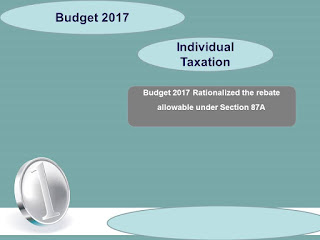Currently in case of joint
development agreement between the owner of immovable property and the
developer, the capital gain tax liability arises in the hand of owner in the
year in which the possession of
immovable property is handed over to the developer for development of project.
Under the existing
provision, capital gain is chargeable to tax in the year in which transfer
takes place expect in certain cases.
“Transfer”: includes any arrangement
or transaction where any rights are handed over in execution of part
performance of contract, even though the legal title has not been transferred.
Thus with a view to
minimise the hardship which the owner of land may face in paying capital gain
tax in the year of transfer, Budget 2017 propose to insert new sub section 5A
under section 45.
Ø
It provides that in case of assesse being individual or Hindu undivided
family, who enters into a specified agreement for development of a project, the
capital gains shall be chargeable to income-tax as income of the previous year
in which the certificate of completion for the whole or part of the project is
issued by the competent authority.
Ø
It is further proposed to provide that the stamp duty value of his
share, being land or building or both, in the project on the date of issuing of
said certificate of completion as increased by any monetary consideration
received, if any, shall be deemed to be the full value of the consideration
received or accruing as a result of the transfer of the capital asset.
Ø
It is also proposed to provide that benefit of this proposed regime
shall not apply to an assesse who transfers his share in the project to any
other person on or before the date of issue of said certificate of completion. It
is also proposed to provide that in such a situation, the capital gains as determined
under general provisions of the Act shall be deemed to be the income of the previous
year in which such transfer took place and shall be computed as per provisions
of the Act without taking into account this proposed provisions.
Ø
It is also proposed to define the following expressions
"competent authority", "specified agreement" and
"stamp duty value" for this purpose.
Ø
It is also proposed to make consequential amendment in section 49
so as to provide that the cost of acquisition of the share in the project being
land or building or both, in the hands of the land owner shall be the amount
which is deemed as full value of consideration under the said proposed
provision.
Explanation:
(i)
“competent authority” means the authority empowered to approve the
building plan by or under any law for the time being in force
(ii)
“specified agreement” means a registered agreement in which a
person owning land or
building or both, agrees to allow another person to develop a real
estate project on such land or building or both, in consideration of a share,
being land or building or both in such project, whether with or without payment
of part of the consideration in cash;
(iii)
“Stamp duty value” means the value adopted or assessed or
assessable by any authority of Government for the purpose of payment of stamp
duty in respect of an immovable property being land or building or both.’
The above amendment will
applicable from previous year 2017-18 and subsequent years.












